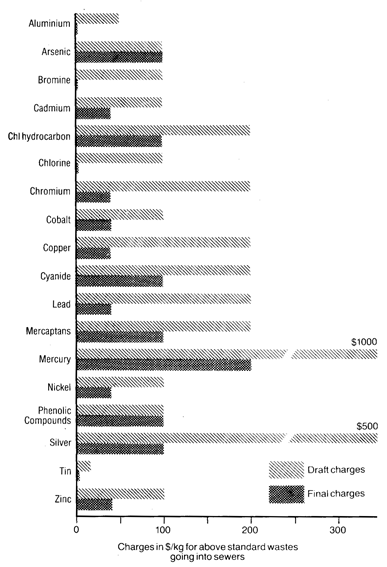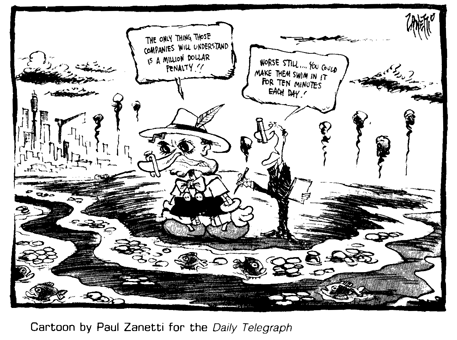
by Sharon Beder
first published by Allen & Unwin, Sydney, 1989
Introduction
Sewers seaward
Toothless watchdog
Toxic fish
Sewer-side surfing
Public relations battle
Events of 1989
Beyond Sydney
Conclusion
Bibliography
Industry has lobbied to keep trade waste charges to a minimum. The Board's draft trade waste policy penalised industries very heavily that discharged toxic chemicals above maximum allowable concentrations. The final policy that emerged after negotiation with government and industry was very much watered down. Reference to ‘penalties’ and ‘maximum allowable concentrations’ had been removed and charges were considerably reduced (see figure 3.9). In the final policy, there is no marked difference between charges below and above what used to be maximum allowable concentrations. This offers little incentive to industry to stay under these concentrations in their discharges and virtually defeats the aims of the Trade Waste Manager to establish effective financial incentives to industry to keep restricted substances out of their waste.
Figure 3.9 Proposed industrial waste charges compared with final official charges.

The final charges set down in the 1988 Trade Waste Policy for wastes going into the sewer that are above the set standard are much lower than was originally proposed. For example, Mercury was going to cost $1000 per kg under the draft policy if it was discharged in high concentrations but this was altered after negotiation with industry and government and will now only cost $200 per kg.
A study done by Nils Dreyer for Greenpeace in March 1989 surveyed nineteen companies that acted as consultants for or supplied pre-treatment and pollution control equipment to industry. Dreyer wanted to see what impact the new trade waste policy was having on their sales. Far from finding that business was booming, several firms were very disappointed with the response of industry to the trade waste policy and few had any work as a result. In particular, the electroplating industry, which is responsible for much heavy metal waste going into the sewers, was hardly responding at all. Also, Dreyer was told by a firm specialising in biological treatment and a consulting engineer that the Board’s charges for organic industrial waste and grease would have to be trebled before industry would be willing to install their own treatment plants.
